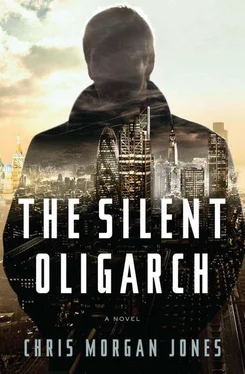From the kiosk on the far side of Red Square he bought two tickets, one for himself and one for his blond companion, who took it with some awkwardness. In among bands of tourists he passed through the broad wooden gate in the outer wall and into a long avenue of trees. As he walked he was amazed by how fine the buildings were, and how immaculately everything was kept—the paths clean, the verges trimmed, the grass a deep green even now, in winter. Russian government buildings weren’t like this. They were grubby and practical. This was luminous and serene, and rich with the spirit of the country it governed. The offices, vast and painted a deep yellow, had a rationalist air at odds with the pure white and onion domes of the churches and cathedrals; the one looked north and west, the other south and east. Together they suggested to him the sentimental greatness of Russia. Against every expectation, he was moved. There was such beauty here. How easy, he thought, to rule without fear of redress from a place such as this.
He spent a little over an hour there, then tired. He would have liked to discuss some of what he was thinking with his chaperone but didn’t feel that he could. He was hungry, but didn’t want to eat alone. He wanted to see Oksana. In fact, he needed to: he needed someone to call him at Chekhanov’s office, and she was the only person he knew in Moscow he might trust. As he walked back into Red Square he took his phone and called her, for the first time since she had left him in Café Pushkin. As he dialed, the same electronic squeal that he had heard in London the week before played in his ear, and he realized with a new sting of anxiety that someone was probably listening to his calls. Of course they were. Only dimly hearing Oksana’s voice-mail message, he hung up.
His spirits, so carefully buoyed, collapsed. Who was listening to his calls? Probably Malin. Possibly Ikertu. Both? Could two groups of people tap the same phone? He had no idea. It hardly mattered. He had no one to talk to anyway. Putting the phone back in his pocket he turned to his bodyguard and told him that he wanted to go home.
ON TUESDAY MORNING he was in the office early, around eight. There was an e-mail waiting for him from Kesler, sent a little after ten, his time, the evening before. Lock expected it to be about New York, the next item on the legal agenda. Instead it told him that the Financial Crimes Unit of the Royal Cayman Islands Police Service wanted to interview him about “irregularities of ownership” in certain companies under his control. If he could attend a meeting the following week that would suit them. Kesler explained that if he did go it would be only with a guarantee from the island of temporary immunity.
This was the first official investigation. Newspapers and lawsuits and hints from Swiss prosecutors were one thing, this was another. Kesler was in the United States this week. Lock couldn’t call him until the afternoon. He wanted to know whether this was serious. He also wanted to know whether he would be allowed to go. His guess was that if he knew about it, he would be going. He would find out this evening when he saw Malin.
In the meantime, he had some last-minute planning to do. Even if he couldn’t be arrested in Cayman he wanted to be prepared to negotiate. He wanted something to offer them, and this meant that he had to go through with his plan that evening. He might not get another chance.
He had made some progress with the lock. He had realized finally that he needed two pins, not one, and fashioned something near the thickness of the hair clip, the only one he could find, from tightly twisting two paper clips together. It now took him about thirty seconds to open his own filing cabinet. He could only hope that Chekhanov’s locks were the same.
Oksana would not be helping him. He had called her once more, on Sunday morning, but again she hadn’t answered. He suspected she wasn’t talking to him for his own good. In any case, he had thought of a way around the practical problem. There was a stopwatch on one of his phones that had a countdown function. By changing the sounds you could make it ring as if for a new call when the count reached zero. Before his meeting, he would set it to count down from fifteen seconds, and then activate it from his pocket. He had practiced, and it worked: down button twice, right once, down once, center button.
His day was not productive, nor quick. Normal life continued in the network of companies, and he should have been signing documents and transferring money and opening bank accounts and making sure that everybody else was doing what they should be doing. But he couldn’t concentrate. Two scenes occupied his mind. In one, he was being led away from Chekhanov’s office by two enormous henchmen as Chekhanov himself looked coldly on; in the other, he was in a fluorescent-lit office in Cayman, bargaining feverishly with a pair of stony-eyed policemen.
Time dragged. He skipped lunch, and then regretted doing so. He smoked halfheartedly. By the time he came to leave for the meeting he was feeling light-headed and oddly detached.
Chekhanov’s office was in a low building above a row of shops: a café, a shoe shop, an electrical repair shop. It gave no hint of how much money and influence lay within. Wooden doors in the middle of the row opened onto a wooden staircase, its gray paint chipped away, lit by a single fluorescent bulb on the wall. Lock walked up two flights. Two doors opened off the landing at the top. He turned to the right and pressed the bell. A dull brass sign by the door read “Industrial and Economic Holdings Z.A.O.” As he waited Lock checked his equipment: one hair clip, the paper clips wound together, his countdown phone, his normal phone, his BlackBerry with its camera. All present, and none of it incriminating. His hand felt clammy in his pocket and he tried to dry it on the lining.
A key turned in the lock on the other side and the door opened. Chekhanov’s secretary showed Lock in, without pleasantries, and for a minute or two he stood in the reception area, unable to decide whether to sit down. Not many people were received here, he thought. Throughout the offices the walls were lined with wood, vertical strips of pine varnished a deep red brown, and the only decoration was a single frame displaying an incorporation document for Industrial and Economic Holdings. Two low steel chairs, their upholstery worn, were set against the wall facing the receptionist’s desk, between them a chipboard coffee table with nothing on it. The room smelled dusty, as if someone had just vacuumed.
The receptionist’s phone rang. “Mr. Chekhanov is ready now.”
Lock walked past her desk and down a corridor, taking the second door on the right. In here were the same pine walls, the same institutional hard gray carpet. Hanging behind Chekhanov’s desk was a Russian coat of arms, a gold double-headed eagle against a field of bright red.
Chekhanov rose, leaned forward across the desk and shook hands. His hand felt small and dry. His skin looked stretched across his face and the sharp ridge of his nose. Lock had noticed long ago that he never seemed to blink.
“Richard. It is good to see you.”
“Alexei. I hope you’re well.”
“Yes. Busy. I was in Tyumen last week. I have returned to a mess.”
Lock smiled what he hoped was an easy smile. “I know the feeling.”
“Hm?”
“I’ve been away since I saw you last. I’m only just recovering.”
“Good. Good.” Chekhanov was looking at his computer, distracted. At least he made no comment about Paris. “Has Konstantin mentioned this company in Burgas? Refining. I need to talk to you about it.”
“No. No, he hasn’t.”
Chekhanov sat down. On his desk were three mobile phones. Two were dismantled, their batteries out; one was not. He picked it up and slid the battery casing off.
Читать дальше












